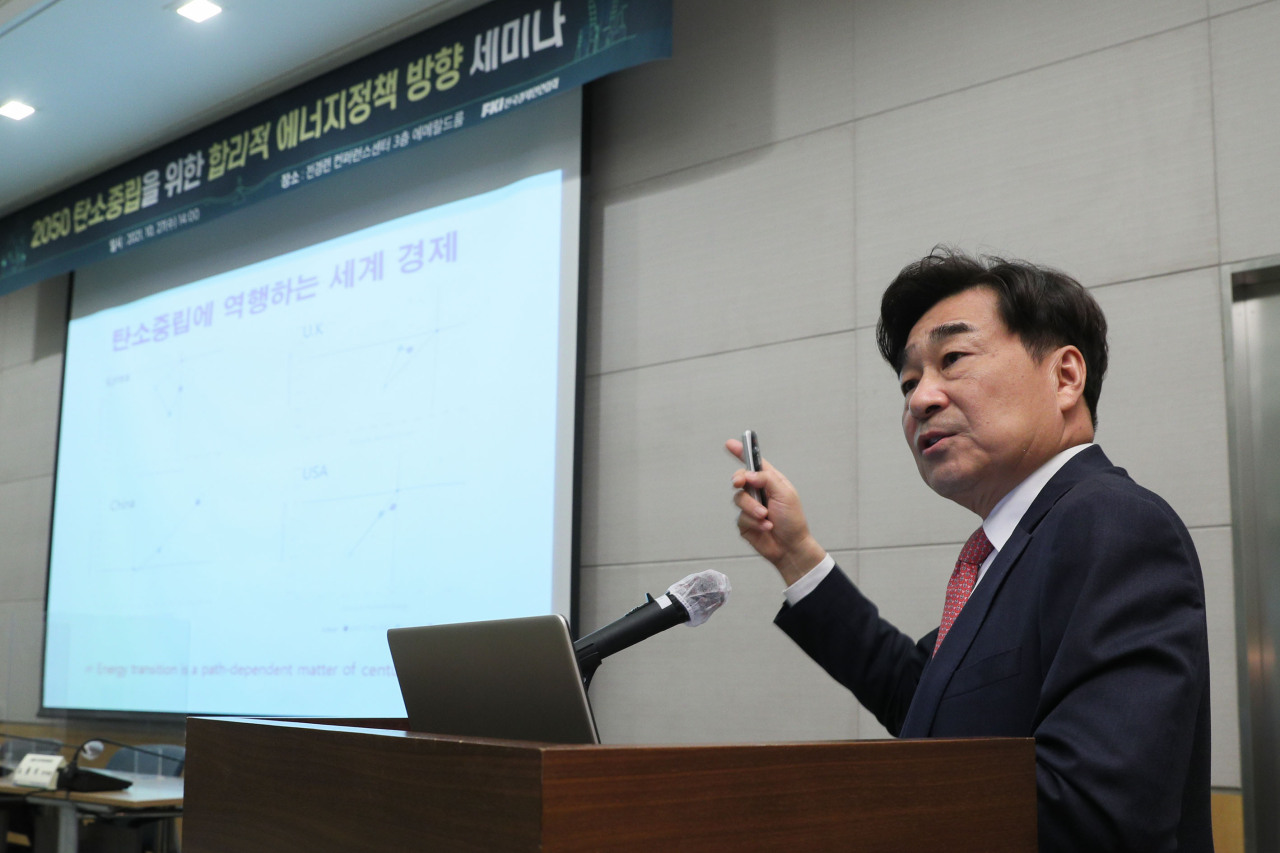Voices of caution as Cabinet endorses new emissions goal
Energy, economy experts question feasibility of government’s 2050 net zero plan
By Kim Da-solPublished : Oct. 27, 2021 - 15:37
South Korea’s Cabinet on Wednesday endorsed a plan to reduce greenhouse gas emissions by 40 percent from the 2018 level by 2030, sharply increasing the previous goal, set last year, of a 26.3 percent cut.
In response to the new goal, conservative experts and industry insiders are voicing caution.
At a seminar hosted by the Federation of Korea Industries on Wednesday, Park Ju-heon, professor of economics at Dongduk Women’s University said the energy transition should be not hurried.
“An energy transition takes time, nearly a century. So we never have to rush. A gradual increase in the renewable energy usage is a must. That’s why we should keep the current nuclear power operation level to earn time for energy transition, with use of other options like liquefied natural gas,” said Park. The FKI is a lobbying body for big conglomerates.
In response to the new goal, conservative experts and industry insiders are voicing caution.
At a seminar hosted by the Federation of Korea Industries on Wednesday, Park Ju-heon, professor of economics at Dongduk Women’s University said the energy transition should be not hurried.
“An energy transition takes time, nearly a century. So we never have to rush. A gradual increase in the renewable energy usage is a must. That’s why we should keep the current nuclear power operation level to earn time for energy transition, with use of other options like liquefied natural gas,” said Park. The FKI is a lobbying body for big conglomerates.

A carbon-neutral LNG has gained attention recently for its benefits and as a tool for many advanced countries’ energy transition to tackle emissions. Often dubbed the cleanest fossil fuel, LNG produces lower carbon emissions. When regasified, natural gas can be also used as fuel for electricity generation.
Park also mentioned that the government should liberalize the monopolized electricity market to increase the efficiency of demand management, paving a way for a new energy market.
“The government excluded coal thermal power generation in its scenario to go net zero by 2050, but it can be useful when combined with CCUS technology,” he said.
CCUS refers to carbon capture, utilization and storage, which has risen as the efficient CO2 emissions reduction technology in the long-term. The technology can capture up to 90 percent of CO2 emissions that are released by burning fossil fuels during electricity generation and industrial processes such as steel or cement production.
On Wednesday, the Cabinet passed the Climate Crisis Response Act to mandate up to a 40 percent cut in greenhouse gas emissions by 2030 compared to the 2018 level, in line with the Moon Jae-in government’s commitment to reaching net-zero emissions by 2050.
President Moon first brought up the 2050 carbon neutrality plan last year along with push for hydrogen as the country’s major energy source for power generation and transportation.
Experts also pointed to the cost it takes to create carbon zero society.
According to data from Seoul National University’s Nuclear Energy Policy Center, electricity bills will increase by 120 percent compared to the current level when the government increases the new renewable energy ratio to 80 percent level based on its 2050 net zero policy.
“This means that it will take until 2050 to reach net zero carbon and cost more than 1,200 trillion won ($1 trillion), double the amount of the government's 2022 budget,” said Noh Dong-seok, a researcher at Seoul National University’s Nuclear Energy Policy Center.
“Countries like the US, the UK, France, Japan and China still use nuclear power generation as the main source of energy, even while on track to go net zero,” he added.
Lack of feasibility in the government’s energy plan is another concern, experts viewed.
“When you look at the EU’s greenhouse gas reduction rate, it hovers at 1.98 percent but South Korea has set the target to 4.17 percent. It is questionable if Korea can reach the goal,” said Lee Dong-kyu, professor of economics at University of Seoul.
Referring to industries that create excessive carbon emissions such as steel or cement production as the enemy and forcing them to sacrifice in the process of energy transition is also a great concern, Lee added.
According to market data, South Korea’s major 11 conglomerates were responsible for 64 percent of greenhouse gases emitted in the country last year. Besides the government-owned Korea Electric Power Co., steelmaker Posco, Hyundai Motor, SK and GS Group have topped the chart for emissions in 2020.
By Kim Da-sol (ddd@heraldcorp.com)








![[Graphic News] More Koreans say they plan long-distance trips this year](http://res.heraldm.com/phpwas/restmb_idxmake.php?idx=644&simg=/content/image/2024/04/17/20240417050828_0.gif&u=)
![[KH Explains] Hyundai's full hybrid edge to pay off amid slow transition to pure EVs](http://res.heraldm.com/phpwas/restmb_idxmake.php?idx=644&simg=/content/image/2024/04/18/20240418050645_0.jpg&u=20240419100350)






![[From the Scene] Monks, Buddhists hail return of remains of Buddhas](http://res.heraldm.com/phpwas/restmb_idxmake.php?idx=652&simg=/content/image/2024/04/19/20240419050617_0.jpg&u=20240419175937)

![[KH Explains] Hyundai's full hybrid edge to pay off amid slow transition to pure EVs](http://res.heraldm.com/phpwas/restmb_idxmake.php?idx=652&simg=/content/image/2024/04/18/20240418050645_0.jpg&u=20240419100350)

![[Today’s K-pop] Illit drops debut single remix](http://res.heraldm.com/phpwas/restmb_idxmake.php?idx=642&simg=/content/image/2024/04/19/20240419050612_0.jpg&u=)